Mourners carry the coffin of a soldier killed in clashes in Ramadi, during his funeral in Najaf yesterday.
AFP/Baghdad
Iraqi forces pressed their attack on anti-government fighters holding parts of a city yesterday as the UN warned of an “exponential rise” in displacement with 22,000 families having fled their homes.
Violence elsewhere killed 10 people, bringing to 700 the number killed in nationwide unrest this month, fuelling fears Iraq is slipping back into the all-out conflict that left tens of thousands dead in 2006 and 2007.
Diplomats have urged Baghdad to foster political reconciliation to undercut support for militants, but with elections looming in April, Prime Minister Nuri al-Maliki and others have taken a hard line and focused on wide-ranging security operations.
Iraq also announced the execution of 26 men convicted of “terrorism” yesterday, the latest in a sharp increase in Baghdad’s use of capital punishment as violence has spiked.
Security personnel, including soldiers, policemen and SWAT forces working with pro-government tribal fighters, continued to assault key neighbourhoods of Ramadi in a bid to wrest back control from gunmen who have held the areas for more than three weeks.
They suffered casualties, however, with a dozen security personnel and tribesmen wounded by snipers during clashes in the central Ramadi neighbourhoods of Malaab and Dhubat, a police major and Dr Mohamed Fanoos from the city’s hospital said.
Fallujah, a former insurgent bastion a short drive from Baghdad, was still in the control of Al Qaeda, however, with residents saying on Monday that the gunmen were tightening their grip at the expense of tribal sheikhs.
Both Ramadi and Fallujah are in Anbar province, a mostly Sunni desert province west of Baghdad along the border with Syria.
The United Nations warned yesterday of “an exponential increase in the number of displaced and stranded families”, with more than 22,000 families having registered as internally displaced.
The UN said the actual figure was likely to be higher, as not all those who fled had registered. It said of those who had left, most had found refuge elsewhere in Anbar, but some had gone as far afield as the northern Kurdish region.
Violence in the restive cities of Mosul and Baquba, both north of Baghdad, meanwhile left six people dead, security and medical officials said, while a car bomb in the capital killed at least four others.
UN chief Ban Ki-moon and other diplomats have called for the Shia-led authorities to address long-standing grievances in the disaffected Sunni minority, and officials have made some concessions.
But with elections due on April 30, Iraq’s leaders have shown little appetite for compromise, instead trumpeting security operations against militants.
The government yesterday also announced the execution of 26 men convicted of “terrorism”, including a Sunni anti-Al Qaeda militia leader whose arrest in 2009 sparked fierce street battles in Baghdad.

